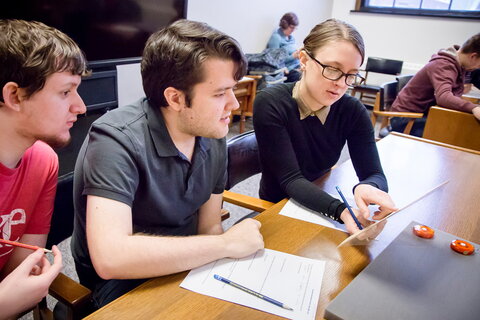
The Gateway
History 200: Introduction to Historical Interpretation is a seminar required of all History majors. We offer four sections of History 200 per term, each of which is capped at 20. Each section is devoted to a different topic , so it is essential that you choose the section that best suits your own interests. Normally, History 200 meets twice per week, for 80-minute sessions.
History 200 is designed to help students acquire and practice the skills they will need in order to pursue advanced coursework in history. These skills include:
- reading and listening closely, with understanding and attention to detail
- expressing ideas clearly, verbally and in writing
- the ability to identify the authors, audiences, types, and potential uses of different primary sources
- the ability to analyze works of historical scholarship and to critique historical arguments
- the ability to assess a range of competing historical interpretations of a particular event, source, or problem
- the ability to offer an informed interpretation of primary evidence that supports, counters, or extends the interpretations offered by practicing historians
- mastery of basic library skills .
In general, the writing assignments in this course will be frequent, short, and practical, providing many opportunities for evaluation and feedback. They may take the form of response papers, sets of discussion questions or debating points, thesis statements, outlines, annotated bibliographies, oral reports, brief essays, and so on. Although students will be required to produce a final paper, this does not usually involve independent research (that is the goal of History 498). Students must earn a C or higher in HIST 200 to be considered a History major in good standing.
The Capstone
History 498: Research and Writing Seminar is the capstone course for all history majors, in which each student will produce an original research paper based on primary source material, with reference to recent historical scholarship in the field. Students normally take this course in the junior or senior year. We offer three topic-specific sections of History 498 per term, each of which is capped at 15. Because each History 498 seminar is different, it is essential that you choose to enroll in the section that most closely suits your own interests. Normally, this course meets one day a week, for a two-hour session.
History 498 presupposes that students have acquired the essential skills taught in History 200, and that they have been building on those skills in advanced coursework. In History 498, accordingly, students will be expected to:
- evaluate and question dominant historical narratives
- deal with ambiguity and contradictions in secondary scholarship
- weigh the trustworthiness and/or utility of different arguments
- analyze, contextualize, and interrogate a variety of primary sources
- identify methodological problems
- apply key analytical categories
- develop their own perspectives and interpretations
- build and support their own historical arguments
- demonstrate mastery of advanced library skills.
Research papers produced in this seminar usually average 20-25 pages. Students who would like to pursue research in libraries and archives off campus, and who need access to special resources or equipment, should consider applying for an Undergraduate Research Grant .
Advanced hours
Advanced hours in LAS are defined as courses at the 300 and 400 level. Students are required to have a minimum of 21 advanced hours completed on campus to graduate. For history majors, 18 of those hours must be history courses (12 for students in the secondary education minor).